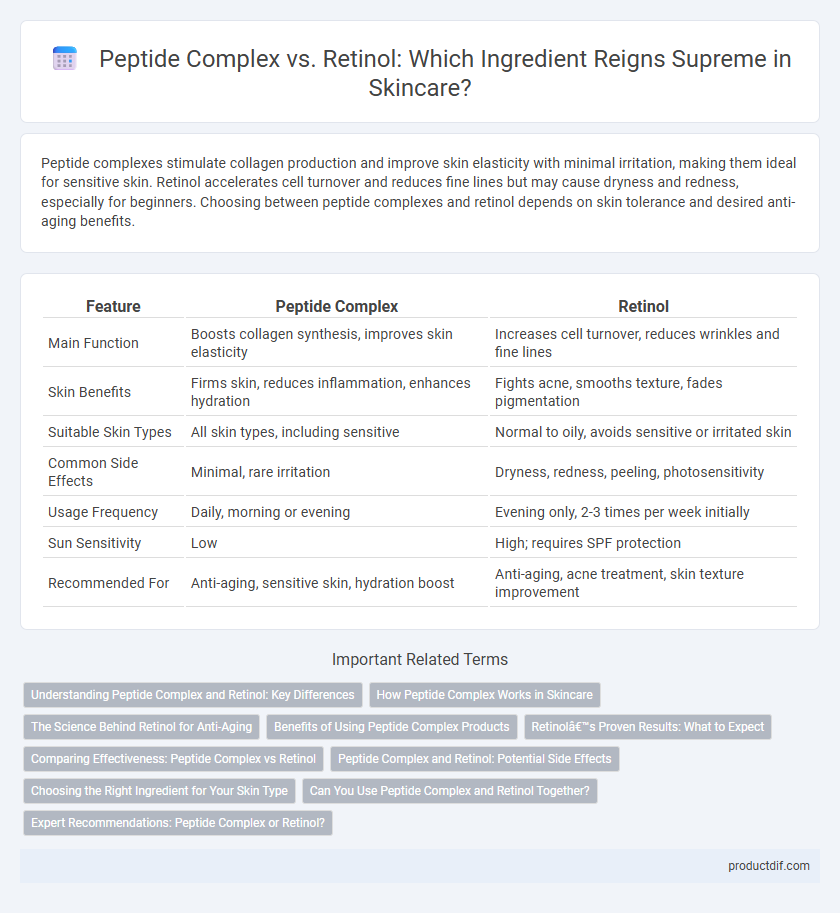Peptide complexes stimulate collagen production and improve skin elasticity with minimal irritation, making them ideal for sensitive skin. Retinol accelerates cell turnover and reduces fine lines but may cause dryness and redness, especially for beginners. Choosing between peptide complexes and retinol depends on skin tolerance and desired anti-aging benefits.
Table of Comparison
| Feature | Peptide Complex | Retinol |
|---|---|---|
| Main Function | Boosts collagen synthesis, improves skin elasticity | Increases cell turnover, reduces wrinkles and fine lines |
| Skin Benefits | Firms skin, reduces inflammation, enhances hydration | Fights acne, smooths texture, fades pigmentation |
| Suitable Skin Types | All skin types, including sensitive | Normal to oily, avoids sensitive or irritated skin |
| Common Side Effects | Minimal, rare irritation | Dryness, redness, peeling, photosensitivity |
| Usage Frequency | Daily, morning or evening | Evening only, 2-3 times per week initially |
| Sun Sensitivity | Low | High; requires SPF protection |
| Recommended For | Anti-aging, sensitive skin, hydration boost | Anti-aging, acne treatment, skin texture improvement |
Understanding Peptide Complex and Retinol: Key Differences
Peptide complexes stimulate collagen production and enhance skin elasticity by delivering short chains of amino acids, promoting skin repair and firmness. Retinol, a vitamin A derivative, accelerates cell turnover and fights signs of aging by reducing fine lines, wrinkles, and pigmentation. Unlike retinol, peptide complexes offer a gentler, non-irritating option suitable for sensitive skin while providing targeted anti-aging benefits.
How Peptide Complex Works in Skincare
Peptide complex in skincare functions by stimulating collagen production and promoting skin cell regeneration, which enhances firmness and reduces wrinkles. These short chains of amino acids penetrate the skin barrier to signal repair mechanisms and improve skin elasticity. Unlike retinol, peptide complexes offer a gentle, non-irritating method to support skin renewal and hydration without causing sensitivity.
The Science Behind Retinol for Anti-Aging
Retinol, a derivative of vitamin A, accelerates skin cell turnover and stimulates collagen production, essential for reducing wrinkles and fine lines. Unlike peptide complexes that signal skin repair through amino acid chains, retinol directly influences gene expression to promote epidermal thickening and improve skin texture. Its scientifically proven ability to enhance cellular renewal makes retinol a cornerstone ingredient in effective anti-aging skincare.
Benefits of Using Peptide Complex Products
Peptide complex products stimulate collagen production, enhancing skin elasticity and reducing fine lines and wrinkles more gently than retinol, making them suitable for sensitive skin. These peptides improve skin barrier function and hydration, promoting a smoother, plumper complexion without the irritation commonly associated with retinoids. Consistent use of peptide complexes supports cell regeneration and skin repair, resulting in healthier and more resilient skin over time.
Retinol’s Proven Results: What to Expect
Retinol is extensively researched and proven to accelerate skin cell turnover, reduce fine lines, and improve skin texture and tone. Clinical studies highlight retinol's ability to stimulate collagen production, leading to visibly firmer, smoother skin with consistent use over several weeks. Expect improved pigmentation, diminished wrinkles, and enhanced overall radiance compared to peptide complexes, which primarily support skin repair rather than deliver dramatic anti-aging effects.
Comparing Effectiveness: Peptide Complex vs Retinol
Peptide complexes stimulate collagen production by signaling skin cells to repair and strengthen tissue, making them effective for skin firming and anti-aging. Retinol, a vitamin A derivative, accelerates cell turnover and boosts collagen synthesis, often providing faster and more visible results in reducing fine lines and wrinkles. While retinol can cause irritation for sensitive skin, peptide complexes offer a gentler alternative for sustained skin rejuvenation with less risk of adverse effects.
Peptide Complex and Retinol: Potential Side Effects
Peptide complexes are generally well-tolerated with minimal risk of irritation, making them suitable for sensitive skin types seeking anti-aging benefits. Retinol, a potent vitamin A derivative, can cause redness, dryness, and peeling, especially during initial use or in higher concentrations. Careful introduction and use of moisturizers help mitigate retinol's potential side effects, while peptides provide a gentler alternative with fewer adverse reactions.
Choosing the Right Ingredient for Your Skin Type
Peptide complexes support collagen production and skin repair, making them ideal for sensitive or mature skin seeking gentle anti-aging benefits. Retinol offers powerful exfoliation and cellular turnover, preferred for oily or acne-prone skin but may cause irritation for beginners or sensitive skin types. Selecting between peptides and retinol depends on your skin's tolerance, sensitivity, and specific anti-aging concerns for optimal results.
Can You Use Peptide Complex and Retinol Together?
Peptide complex and retinol can be used together effectively to enhance skin regeneration and collagen production, as peptides support cell signaling while retinol accelerates cell turnover. Combining these ingredients minimizes irritation by applying peptides first to strengthen the skin barrier before retinol treatment. Dermatologists recommend starting with lower retinol concentrations to allow skin adjustment and pairing with peptides for improved hydration and anti-aging benefits.
Expert Recommendations: Peptide Complex or Retinol?
Expert recommendations often favor peptide complexes for individuals with sensitive or mature skin due to their ability to stimulate collagen production without irritation. Retinol remains highly effective for acne-prone and aging skin by accelerating cell turnover and reducing fine lines, but it requires careful use to avoid dryness or redness. Combining peptide complexes with retinol under professional guidance can optimize anti-aging results while minimizing potential side effects.
Peptide Complex vs Retinol Infographic

 productdif.com
productdif.com